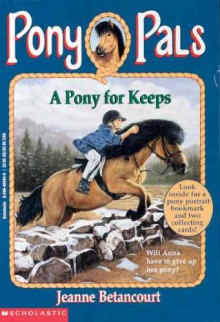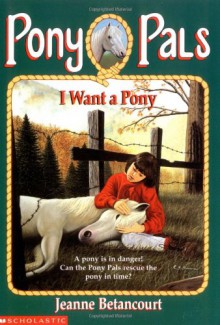

 |
| Reading some old pony book should not be this emotional! *sob* |
After the relative boredom I felt while reading I Want a Pony, I didn't expect A Pony for Keeps to hit me in the emotions... but it definitely did. Few common themes of children's literature upset me quite as hard as parents who disregard, neglect, or invalidate their children's emotional needs, and that is definitely what's going on in A Pony for Keeps. I'm sure there are plenty of other readers who get through this book without more than a "meh", but I just can't get through these kinds of books without my heart breaking just a bit for the kid in question.
In A Pony for Keeps, Anna wants to finally purchase Acorn, the pony she's been leasing. But her parents have other plans; if she can't pick up her grades, they're going to get rid of Anna's beloved Acorn. Their explanation is that Acorn is obviously just distracting Anna from studying... except that she studies constantly throughout the book, and they still accuse Acorn of being the problem when these hours of studying don't help their daughter before her next report card.
Throughout the novel, it is incredibly obvious that Anna suffers from dyslexia, which reduces her parent's actions from "delivering an emotionally crippling punishment to their daughter because she isn't performing well academically" to "deliver an emotionally crippling punishment to their daughter because she has a learning disability". It makes me wonder how many children this has actually happened to... and then, it makes me sick.
Because it's an elementary-targeted book in a series about three girls and their ponies, it should come as a surprise to no one that things work out for Anna and Acorn... but Anna's parents still come out looking like heartless morons. Not only do they never catch on to their daughter's actual issue--the various other adults in Anna's life have to go out of their way to explain it to them--but they actually go through with their threats to get rid of Acorn, even arranging things so that, if they hadn't changed their minds at the last minute, Anna would never have had a chance to say goodbye to her--let me repeat--beloved pet. More importantly, perhaps, they do not change their minds about this ludicrous punishment until Anna's teacher explains to these absolute imbeciles that they are delivering "a punishment for something that hasn't been [Anna's] fault". Someone has to tell these people that it isn't acceptable to give away someone's pet as punishment for having a goddamn learning disability!?
...my anger aside, children who suffered dyslexia will likely sympathize with Anna's (fairly short) journey to understanding her difficulties, though particularly sensitive children might fall more in line with my complaints. (I'll point out that I am 99% sure I read this book as a child and did not notice how problematic their behavior was... but this might say more about my own parents' style than anything else...) But I definitely don't mean to imply that it's a bad book just because I have an issue with the parent/child power imbalance. Children with dyslexia, learning disabilities, or just a sincere love of ponies will probably get a kick out of the story.

Pony Pals is yet another series I read as a young girl (I read a lot as a child, yes), but I don't remember it nearly as fondly as some of the others I've reviewed recently. Rereading it, I can see why; I Want a Pony isn't exactly a spectacular book.
Let me start off by saying that, honestly, some of my dissatisfaction with this reread is tactile. Seriously. The copy of I Want a Pony that's currently sitting in front of me is a library copy from 1994. The pages are rough and yellow/browning with age, and I think it actually had the weird effect of making the book seem stuffier and less alive than it would have if the copy had been freshly published on crisp, smooth, white paper.
Of course, I can't blame it all on that. The simple fact of I Want a Pony is that the first half of the book is dull. Lulu doesn't want to live with her grandmother in Wiggins. Lulu wants a pony. Lulu wants to be friends with the girl next door, who has a pony. Lulu sneaks visits to the pony next door, Acorn. Lulu spies on the girl next door, Anna, and her pony-riding friend, Pam. Lulu does this. Lulu does that. Lulu does nothing of particular interest.
Then, finally, she does something to get the plot going about halfway through. She stumbles across a pony that's been hurt--one that she's visited before and has immediately bonded with--and the real plot of the book begins. Snow White, the pony, belongs to Baxter family; the daughter and mother love the pony, but the daughter's away at boarding school. The father is an asshole who cares more about his wallet than the live of an innocent creature and demands that the non-life-threateningly injured Snow White be euthanized on the assumption that she won't be a prize winner anymore, which is absolutely stomach-churning... and yet this is the second time I've seen it happen in as many child-targeted horse series.
Anyway, I'm sure it's no spoiler to say that Snow White is not euthanized. And, since the series title is Pony Pals, it also shouldn't come as a surprise to anyone that Lulu and Snow White join the other two girls and two ponies to form the sextet of friends.
If you happen to have one of those little girls or boys who's in their pony, horse, and unicorn phase, I Want a Pony definitely isn't the worst choice you can make. When I was part of the target audience, I genuinely didn't notice the dull monotony of the first half of the book nor how the ending would inevitably be happy; it shouldn't entertain the age group and/or reading level it's meant for, and it's a long enough series that it will probably last a child through their horse phase, assuming they don't binge.
I'm going to keep reading through it (most of them, I think, will be rereads for me), and I assume that afterwards, I'm going to branch off into other horse-centric series (Saddle Club, Thoroughbred, Phantom Stallion, etcetera). It's not a genre I'm particularly fascinated by, but there's no harm in sampling.
 Fantastic books for young girls getting into reading!! Great stories about friendship and life lessons. The characters deal with all sorts of situations and often find responsible solutions to problems.
Fantastic books for young girls getting into reading!! Great stories about friendship and life lessons. The characters deal with all sorts of situations and often find responsible solutions to problems.